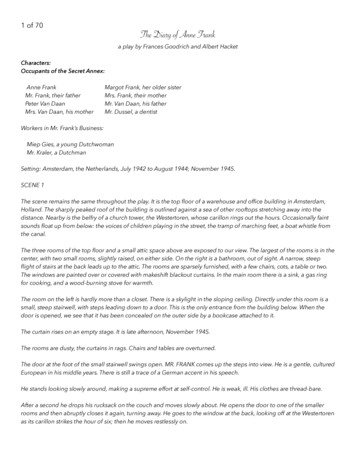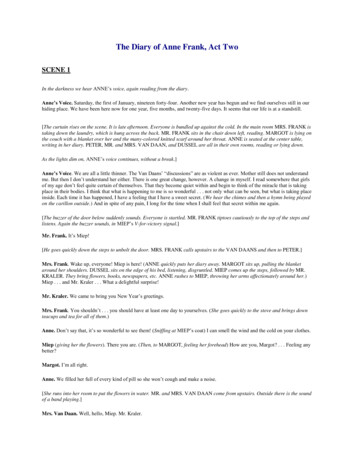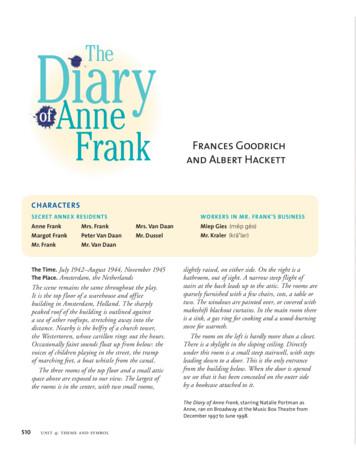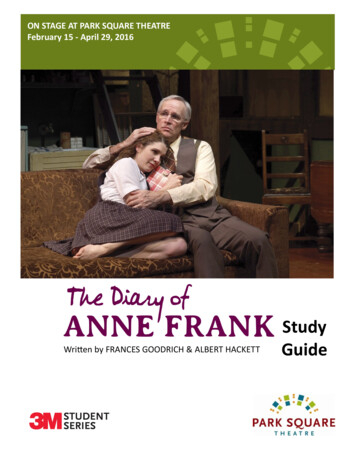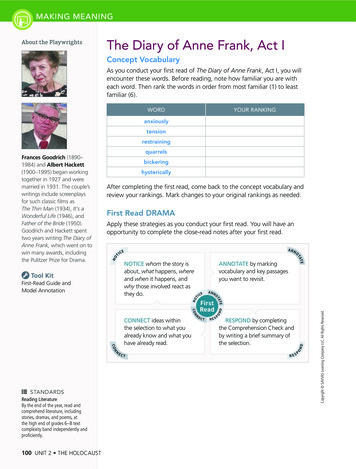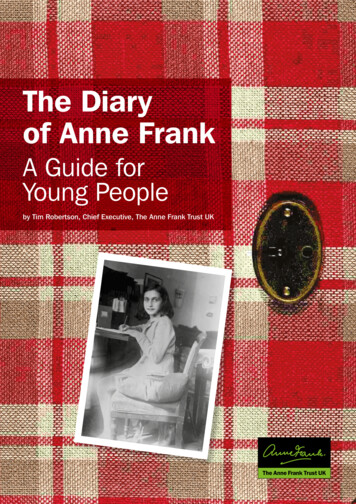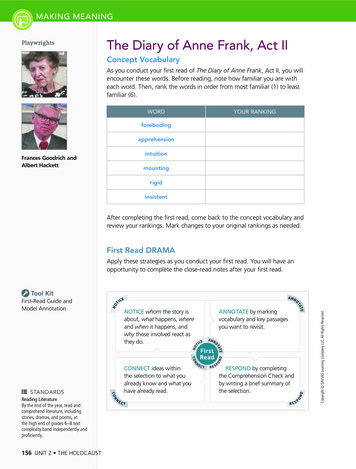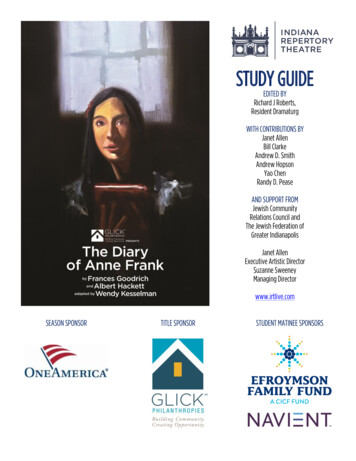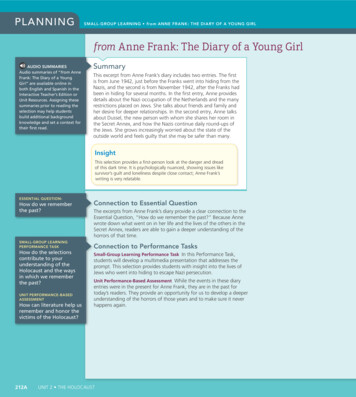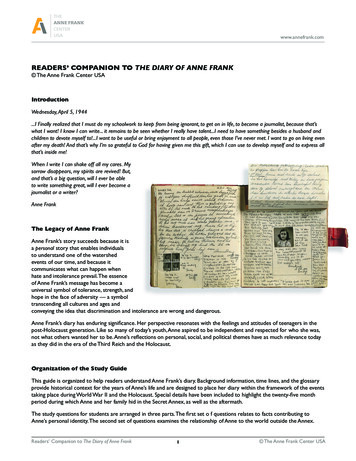
Transcription
Before ReadingThe Diary of Anne FrankVideo link atthinkcentral.comDrama by Frances Goodrich and Albert HackettVIDEO TRAILERKEYWORD: HML8-508IMPACTWhatwillyou have on the world?RL 2 Determine a theme of a textand analyze its development,including its relationship to thecharacters, setting, and plot.RL 10 Read and comprehenddramas.Everyone makes an impact on the world in some way. National leadersor sports heroes may inspire millions, while the rest of us can influencea smaller circle of friends and family through our actions, our beliefs,or our commitments. Whether you make your mark quietly or boldly,a life well lived can be a guide to others. In the play you’re about toread, a young girl doesn’t realize that the thoughts she expresses inher diary will later influence readers all over the world.QUICKWRITE People of all ages make important contributions to theworld. What impact do you now have on others? What impact do youhope to have later in your life? Write your ideas in a brief journal entry.Think about how education and life experience might affect your goalsfor the future.508508-509 NA L08PE-u04s05-brA1.indd 50812/28/10 3:15:42 PM
Meet the Authorstext analysis: themeThe play you are about to read is based on a diary written byAnne Frank, a teenager who spent more than two years hidingfrom the Nazis. When Anne’s diary was published, readersaround the world were profoundly touched that, despite all shehad been through, she still believed people were good at heart.When the playwrights adapted Anne’s diary, they used herbelief in the essential goodness of people as one of the work’sthemes, or messages about life. As you read, notice how Anne’sthoughts and feelings, as well as the characters, setting, andplot, work together to express this theme.reading strategy: reading a dramaIn a drama, a playwright must communicate all the informationabout the characters through dialogue, or words spoken bythe actors, and stage directions, or directions to the crew andactors. This can be challenging when the protagonist (themain character) is going through internal changes, or whenan antagonist (a force in opposition to the protagonist) issomething other than a character. As you read, notice howGoodrich and Hackett meet this challenge. In a chart like theone shown, note important information you learn about Anneand about the Nazi occupation.Information About AnneInformation About Nazi Occupationvocabulary in contextThe following words help the playwrights capture Anne’sexperiences. To see how many you know, try to match eachword from the list with the word or phrase closest in ledindignantlyunabashedforebodingpandemonium1. wild uproar4. angrily7. bold2. displeased5. strengthen8. sorrow3. worry6. sinking feelingFrances Goodrich1890–1984Albert Hackett1900–1995From Comedies to DramaScreenwriting team Frances Goodrich andAlbert Hackett were a married couple knownfor their upbeat comedies and musicals.In the late 1940s, they began working ona drama that would take eight years tocomplete. Their play, The Diary of Anne Frank,was based on Anne Frank’s diary entries. Aspart of their research, the couple traveled toAmsterdam to interview Anne’s father andto see the family’s hiding place. Their playadaptation won a Pulitzer Prize in 1956.background to the playAnne Frank’s DiaryAnne Frank and her family were Jewishcitizens of Germany. When the Nazi party,led by Adolf Hitler, came to power in 1933,the Nazis blamed the country’s problemson the Jews. Jews were stripped of theirrights. Many were eventually sent toconcentration camps, where more than6 million died in what became known asthe Holocaust. The Franks moved to theNetherlands to escape persecution, but theNazis invaded that country in 1940. In orderto survive, Anne’s family went into hidingwhen she was 13 years old. They hid in atticrooms behind Mr. Frank’s office, and severalother Jews joined them. In this “SecretAnnex,” Anne kept a diary about her life inhiding. More than two years later, the group’sworst fears came true when the Nazis foundthem. Everyonewho had been livingyg therewas sentt to concentration camps. Anne’ssdiary wass discovered later.AuthorsorsOnlineneGo to thinkcentral.com.KEYWORD: HML8-509Complete the activities in your Reader/Writer Notebook.55095009508-509 NA L08PE-u04s05-brA1.indd 50912/28/10 3:15:51 PM
TheofAnneFrankFrances Goodrichand Albert HackettCHARACTERSSECRET ANNEX RESIDENTSAnne FrankMargot FrankMr. FrankMrs. FrankPeter Van DaanMr. Van DaanWORKERS IN MR. FRANK’S BUSINESSMrs. Van DaanMr. DusselThe Time. July 1942–August 1944, November 1945The Place. Amsterdam, the NetherlandsThe scene remains the same throughout the play.It is the top floor of a warehouse and officebuilding in Amsterdam, Holland. The sharplypeaked roof of the building is outlined againsta sea of other rooftops, stretching away into thedistance. Nearby is the belfry of a church tower,the Westertoren, whose carillon rings out the hours.Occasionally faint sounds float up from below: thevoices of children playing in the street, the trampof marching feet, a boat whistle from the canal.The three rooms of the top floor and a small atticspace above are exposed to our view. The largest ofthe rooms is in the center, with two small rooms,Miep Gies (mCp gCs)Mr. Kraler (kräPlEr)slightly raised, on either side. On the right is abathroom, out of sight. A narrow steep flight ofstairs at the back leads up to the attic. The rooms aresparsely furnished with a few chairs, cots, a table ortwo. The windows are painted over, or covered withmakeshift blackout curtains. In the main room thereis a sink, a gas ring for cooking and a wood-burningstove for warmth.The room on the left is hardly more than a closet.There is a skylight in the sloping ceiling. Directlyunder this room is a small steep stairwell, with stepsleading down to a door. This is the only entrancefrom the building below. When the door is openedwe see that it has been concealed on the outer sideby a bookcase attached to it.The Diary of Anne Frank, starring Natalie Portman asAnne, ran on Broadway at the Music Box Theatre fromDecember 1997 to June 1998.510unit 4: theme and symbol510-543 NA L08PE-u04s05-AFAc1.indd 51012/28/10 3:16:36 PM
510-543 NA L08PE-u04s05-AFAc1.indd 51112/28/10 3:16:47 PM
ACT ONEScene 140102030512The curtain rises on an empty stage. It is lateafternoon November, 1945.The rooms are dusty, the curtains in rags.Chairs and tables are overturned.The door at the foot of the small stairwell swingsopen. Mr. Frank comes up the steps into view. He is agentle, cultured European in his middle years. There isstill a trace of a German accent in his speech.He stands looking slowly around, making asupreme effort at self-control. He is weak, ill.His clothes are threadbare.After a second he drops his rucksack on the couchand moves slowly about. He opens the door to one ofthe smaller rooms, and then abruptly closes it again,turning away. He goes to the window at the back,looking off at the Westertoren as its carillon strikesthe hour of six, then he moves restlessly on.From the street below we hear the sound of abarrel organ and children’s voices at play. There is amany-colored scarf hanging from a nail. Mr. Franktakes it, putting it around his neck. As he starts backfor his rucksack, his eye is caught by something lyingon the floor. It is a woman’s white glove. He holdsit in his hand and suddenly all of his self-control isgone. He breaks down, crying.We hear footsteps on the stairs. Miep Gies comesup, looking for Mr. Frank. Miep is a Dutch girl ofabout twenty-two. She wears a coat and hat, readyto go home. She is pregnant. Her attitude towardMr. Frank is protective, compassionate.Miep. Are you all right, Mr. Frank?Mr. Frank (quickly controlling himself ). Yes,Miep, yes.Miep. Everyone in the office has gone home . . .It’s after six. (then pleading) Don’t stay up here,Mr. Frank. What’s the use of torturing yourselflike this?506070Mr. Frank. I’ve come to say good-bye . . .I’m leaving here, Miep.Miep. What do you mean? Where are you going?Where?Mr. Frank. I don’t know yet. I haven’t decided.Miep. Mr. Frank, you can’t leave here! This is yourhome! Amsterdam is your home. Your business ishere, waiting for you . . . You’re needed here . . .Now that the war is over, there are things that . . .Mr. Frank. I can’t stay in Amsterdam, Miep. It hastoo many memories for me. Everywhere there’ssomething . . . the house we lived in . . . theschool . . . that street organ playing out there . . .I’m not the person you used to know, Miep.I’m a bitter old man. (breaking off ) Forgive me.I shouldn’t speak to you like this . . . after all thatyou did for us . . . the suffering . . .Miep. No. No. It wasn’t suffering. You can’t saywe suffered. (As she speaks, she straightens a chairwhich is overturned.)Mr. Frank. I know what you went through, youand Mr. Kraler. I’ll remember it as long as I live.(He gives one last look around.) Come, Miep.(He starts for the steps, then remembers his rucksack,going back to get it.)Miep (hurrying up to a cupboard ). Mr. Frank,did you see? There are some of your papers here.(She brings a bundle of papers to him.) We foundthem in a heap of rubbish on the floor after . . .after you left.Mr. Frank. Burn them.(He opens his rucksack to put the glove in it.)Miep. But, Mr. Frank, there are letters, notes . . .Mr. Frank. Burn them. All of them.Miep. Burn this?(She hands him a paperbound notebook.)Mr. Frank (quietly). Anne’s diary. (He opens thediary and begins to read.) “Monday, the sixth ofJuly, nineteen forty-two.” (to Miep) Nineteenunit 4: theme and symbol510-543 NA L08PE-u04s05-AFAc1.indd 51212/28/10 3:16:52 PM
510-543 NA L08PE-u04s05-AFAc1.indd 51312/28/10 3:17:04 PM
8090100110forty-two. Is it possible, Miep? . . . Only threeyears ago. (As he continues his reading, he sits downon the couch.) “Dear Diary, since you and I aregoing to be great friends, I will start by tellingyou about myself. My name is Anne Frank. I amthirteen years old. I was born in Germany thetwelfth of June, nineteen twenty-nine. As myfamily is Jewish, we emigrated to Holland whenHitler came to power.”(As Mr. Frank reads on, another voice joins his,as if coming from the air. It is Anne’s Voice.)Mr. Frank and Anne. “My father started a business,importing spice and herbs. Things went well forus until nineteen forty. Then the war came, andthe Dutch capitulation, followed by the arrivalof the Germans. Then things got very bad forthe Jews.”(Mr. Frank’s Voice dies out. Anne’s Voice continuesalone. The lights dim slowly to darkness. The curtainfalls on the scene.)Anne’s Voice. You could not do this and youcould not do that. They forced Father out of hisbusiness. We had to wear yellow stars.1 I had toturn in my bike. I couldn’t go to a Dutch schoolany more. I couldn’t go to the movies, or ridein an automobile, or even on a streetcar, and amillion other things. But somehow we childrenstill managed to have fun. Yesterday Father toldme we were going into hiding. Where, he wouldn’tsay. At five o’clock this morning Mother woke meand told me to hurry and get dressed. I was to puton as many clothes as I could. It would look toosuspicious if we walked along carrying suitcases.It wasn’t until we were on our way that I learnedwhere we were going. Our hiding place was tobe upstairs in the building where Father usedto have his business. Three other people werecoming in with us . . . the Van Daans and theirson Peter . . . Father knew the Van Daans but wehad never met them . . .(During the last lines the curtain rises on the scene.The lights dim on. Anne’s Voice fades out.)Scene 2120130140150It is early morning, July, 1942. The rooms arebare, as before, but they are now clean and orderly.Mr. Van Daan, a tall, portly man in his lateforties, is in the main room, pacing up and down,nervously smoking a cigarette. His clothes andovercoat are expensive and well cut.Mrs. Van Daan sits on the couch, clutching herpossessions, a hatbox, bags, etc. She is a pretty womanin her early forties. She wears a fur coat over herother clothes.Peter Van Daan is standing at the window of theroom on the right, looking down at the street below.He is a shy, awkward boy of sixteen. He wears a cap,a raincoat, and long Dutch trousers, like “plus fours.”At his feet is a black case, a carrier for his cat.The yellow Star of David is conspicuous on allof their clothes.Mrs. Van Daan (rising, nervous, excited ).Something’s happened to them! I know it!Mr. Van Daan. Now, Kerli!Mrs. Van Daan. Mr. Frank said they’d be hereat seven o’clock. He said . . .Mr. Van Daan. They have two miles to walk.You can’t expect . . .Mrs. Van Daan. They’ve been picked up. That’swhat’s happened. They’ve been taken . . .(Mr. Van Daan indicates that he hears someonecoming.)Mr. Van Daan. You see?(Peter takes up his carrier and his schoolbag, etc.,and goes into the main room as Mr. Frank comesup the stairwell from below. Mr. Frank looks muchyounger now. His movements are brisk, his mannerconfident. He wears an overcoat and carries his hatand a small cardboard box. He crosses to the VanDaans, shaking hands with each of them.)Mr. Frank. Mrs. Van Daan, Mr. Van Daan, Peter.(then, in explanation of their lateness) There were1. yellow stars: the six-pointed Stars of David that the Nazis ordered all Jews to wear for identification.514unit 4: theme and symbol510-543 NA L08PE-u04s05-AFAc1.indd 51412/28/10 3:17:07 PM
160170180190too many of the Green Police2 on the streets . . .we had to take the long way around.(Up the steps come Margot Frank, Mrs. Frank,Miep [not pregnant now] and Mr. Kraler. All ofthem carry bags, packages, and so forth. The Star ofDavid is conspicuous on all of the Franks’ clothing.Margot is eighteen, beautiful, quiet, shy. Mrs. Frankis a young mother, gently bred, reserved. She, likeMr. Frank, has a slight German accent. Mr. Kraleris a Dutchman, dependable, kindly.As Mr. Kraler and Miep go upstage to put downtheir parcels, Mrs. Frank turns back to call Anne.)Mrs. Frank. Anne?(Anne comes running up the stairs. She is thirteen,quick in her movements, interested in everything,mercurial in her emotions. She wears a cape, longwool socks and carries a schoolbag.)Mr. Frank (introducing them). My wife, Edith.Mr. and Mrs. Van Daan (Mrs. Frank hurries over,shaking hands with them.) . . . their son, Peter . . .my daughters, Margot and Anne.(Anne gives a polite little curtsy as she shakes Mr. VanDaan’s hand. Then she immediately starts off on atour of investigation of her new home, going upstairsto the attic room. Miep and Mr. Kraler are puttingthe various things they have brought on the shelves.)Mr. Kraler. I’m sorry there is still so much confusion.Mr. Frank. Please. Don’t think of it. After all,we’ll have plenty of leisure to arrange everythingourselves.Miep (to Mrs. Frank). We put the stores of foodyou sent in here. Your drugs are here . . . soap,linen here.Mrs. Frank. Thank you, Miep.Miep. I made up the beds . . . the way Mr. Frankand Mr. Kraler said. (She starts out.) Forgive me.I have to hurry. I’ve got to go to the other side oftown to get some ration books3 for you.200210220230Mrs. Van Daan. Ration books? If they see ournames on ration books, they’ll know we’re here.Mr. Kraler. There isn’t anything . . .Miep. Don’t worry. Your names won’tTogetherbe on them. (as she hurries out) I’ll beup later.Mr. Frank. Thank you, Miep.Mrs. Frank (to Mr. Kraler). It’s illegal, then, theration books? We’ve never done anything illegal.Mr. Frank. We won’t be living here exactly accordingto regulations. (As Mr. Kraler reassures Mrs. Frank,he takes various small things, such as matches, soap,etc., from his pockets, handing them to her.)Mr. Kraler. This isn’t the black market,4 Mrs.Frank. This is what we call the white market . . .helping all of the hundreds and hundreds who arehiding out in Amsterdam.(The carillon is heard playing the quarter-hourbefore eight. Mr. Kraler looks at his watch. Annestops at the window as she comes down the stairs.)Anne. It’s the Westertoren!Mr. Kraler. I must go. I must be out of here anddownstairs in the office before the workmen gethere. (He starts for the stairs leading out.) Miep orI, or both of us, will be up each day to bring youfood and news and find out what your needs are.Tomorrow I’ll get you a better bolt for the doorat the foot of the stairs. It needs a bolt that youcan throw yourself and open only at our signal.(to Mr. Frank) Oh . . . You’ll tell them aboutthe noise?Mr. Frank. I’ll tell them.Mr. Kraler. Good-bye then for the moment.I’ll come up again, after the workmen leave.Mr. Frank. Good-bye, Mr. Kraler.Mrs. Frank (shaking his hand ). How can we thankyou? (The others murmur their good-byes.)}2. Green Police: the Nazi police who wore green uniforms.3. ration books: books of stamps or coupons issued by the government in wartime. With these coupons,people could purchase scarce items, such as food, clothing, and gasoline.4. black market: a system for selling goods illegally, in violation of rationing and other restrictions.the diary of anne frank: act one510-543 NA L08PE-u04s05-AFAc1.indd 51551512/28/10 3:17:07 PM
Mr. Kraler. I never thought I’d live to see the day240250260270when a man like Mr. Frank would have to go intohiding. When you think—(He breaks off, goingout. Mr. Frank follows him down the steps, boltingthe door after him. In the interval before he returns,Peter goes over to Margot, shaking hands with her.As Mr. Frank comes back up the steps, Mrs. Frankquestions him anxiously.)Mrs. Frank. What did he mean, about the noise?Mr. Frank. First let us take off some of theseclothes. (They all start to take off garment aftergarment. On each of their coats, sweaters, blouses,suits, dresses, is another yellow Star of David. Mr.and Mrs. Frank are underdressed quite simply.The others wear several things, sweaters, extradresses, bathrobes, aprons, nightgowns, etc.)Mr. Van Daan. It’s a wonder we weren’t arrested,walking along the streets . . . Petronella with a furcoat in July . . . and that cat of Peter’s crying allthe way.Anne (as she is removing a pair of panties). A cat?Mrs. Frank (shocked ). Anne, please!Anne. It’s all right. I’ve got on three more.(She pulls off two more. Finally, as they have allremoved their surplus clothes, they look to Mr.Frank, waiting for him to speak.)Mr. Frank. Now. About the noise. While the menare in the building below, we must have completequiet. Every sound can be heard down there, notonly in the workrooms, but in the offices too. Themen come at about eight-thirty, and leave at aboutfive-thirty. So, to be perfectly safe, from eight inthe morning until six in the evening we must moveonly when it is necessary, and then in stockingedfeet. We must not speak above a whisper. Wemust not run any water. We cannot use the sink,or even, forgive me, the w.c.5 The pipes go downthrough the workrooms. It would be heard. Notrash . . . (Mr. Frank stops abruptly as he hears thesound of marching feet from the street below. Everyoneis motionless, paralyzed with fear. Mr. Frank goes280290300310quietly into the room on the right to look down outof the window. Anne runs after him, peering outwith him. The tramping feet pass without stopping.The tension is relieved. Mr. Frank, followed by Anne,returns to the main room and resumes his instructionsto the group.) . . . No trash must ever be thrownout which might reveal that someone is living uphere . . . not even a potato paring. We must burneverything in the stove at night. This is the waywe must live until it is over, if we are to survive.(There is silence for a second.)Mrs. Frank. Until it is over.Mr. Frank (reassuringly). After six we can moveabout . . . we can talk and laugh and have oursupper and read and play games . . . just as wewould at home. (He looks at his watch.) And nowI think it would be wise if we all went to ourrooms, and were settled before eight o’clock. Mrs.Van Daan, you and your husband will be upstairs.I regret that there’s no place up there for Peter.But he will be here, near us. This will be ourcommon room, where we’ll meet to talk and eatand read, like one family.Mr. Van Daan. And where do you and Mrs. Franksleep?Mr. Frank. This room is also our bedroom.Mrs. Van Daan. That isn’t right. We’llsleep here and you take the roomTogetherupstairs.Mr. Van Daan. It’s your place.Mr. Frank. Please. I’ve thought this out for weeks.It’s the best arrangement. The only arrangement.Mrs. Van Daan (to Mr. Frank). Never, never canwe thank you. (then to Mrs. Frank) I don’t knowwhat would have happened to us, if it hadn’t beenfor Mr. Frank.Mr. Frank. You don’t know how your husbandhelped me when I came to this country . . .knowing no one . . . not able to speak thelanguage. I can never repay him for that. (goingto Van Daan) May I help you with your things?}5. w.c.: water closet; toilet.516unit 4: theme and symbol510-543 NA L08PE-u04s05-AFAc1.indd 51612/28/10 3:17:08 PM
Mr. Van Daan. No. No. (to Mrs. Van Daan)320330340350Come along, liefje.6Mrs. Van Daan. You’ll be all right, Peter? You’renot afraid?Peter (embarrassed ). Please, Mother.(They start up the stairs to the attic room above.Mr. Frank turns to Mrs. Frank.)Mr. Frank. You too must have some rest, Edith. Youdidn’t close your eyes last night. Nor you, Margot.Anne. I slept, Father. Wasn’t that funny? I knew itwas the last night in my own bed, and yet I sleptsoundly.Mr. Frank. I’m glad, Anne. Now you’ll be able tohelp me straighten things in here. (to Mrs. Frankand Margot) Come with me . . . You and Margotrest in this room for the time being. (He picks uptheir clothes, starting for the room on the right.)Mrs. Frank. You’re sure . . . ? I could help . . .And Anne hasn’t had her milk . . .Mr. Frank. I’ll give it to her. (to Anne and Peter)Anne, Peter . . . it’s best that you take off yourshoes now, before you forget. (He leads the wayto the room, followed by Margot.)Mrs. Frank. You’re sure you’re not tired, Anne?Anne. I feel fine. I’m going to help Father.Mrs. Frank. Peter, I’m glad you are to be with us.Peter. Yes, Mrs. Frank.(Mrs. Frank goes to join Mr. Frank and Margot.)(During the following scene Mr. Frank helps Margotand Mrs. Frank to hang up their clothes. Then hepersuades them both to lie down and rest. The VanDaans in their room above settle themselves. In themain room Anne and Peter remove their shoes. Petertakes his cat out of the carrier.)Anne. What’s your cat’s name?Peter. Mouschi.7Anne. Mouschi! Mouschi! Mouschi! (She picks upthe cat, walking away with it. To Peter.) I love cats.360370380I have one . . . a darling little cat. But they made meleave her behind. I left some food and a note for theneighbors to take care of her . . . I’m going to missher terribly. What is yours? A him or a her?Peter. He’s a tom. He doesn’t like strangers.(He takes the cat from her, putting it back in itscarrier.)Anne (unabashed ). Then I’ll have to stop beinga stranger, won’t I? Is he fixed?Peter (startled ). Huh?Anne. Did you have him fixed?Peter. No.Anne. Oh, you ought to have him fixed—to keephim from—you know, fighting. Where did yougo to school?Peter. Jewish Secondary.Anne. But that’s where Margot and I go! I neversaw you around.Peter. I used to see you . . . sometimes . . .Anne. You did?Peter. . . . in the school yard. You were always inthe middle of a bunch of kids. (He takes a penknifefrom his pocket.)Anne. Why didn’t you ever come over?Peter. I’m sort of a lone wolf. (He starts to rip offhis Star of David.)Anne. What are you doing?Peter. Taking it off.Anne. But you can’t do that. They’ll arrest youif you go out without your star.(He tosses his knife on the table.)Peter. Who’s going out?Anne. Why, of course! You’re right! Of course wedon’t need them any more. (She picks up his knifeand starts to take her star off.) I wonder what ourfriends will think when we don’t show up today?Peter. I didn’t have any dates with anyone.6. liefje (lCfPyE) Dutch: little darling.7. Mouschi (mLPshC)the diary of anne frank: act one510-543 NA L08PE-u04s05-AFAc1.indd 51751712/28/10 3:17:08 PM
518unit 4: theme and symbol510-543 NA L08PE-u04s05-AFAc1.indd 51812/28/10 3:17:08 PM
390400410420Anne. Oh, I did. I had a date with Jopie to go andplay ping-pong at her house. Do you know Jopiede Waal?8Peter. No.Anne. Jopie’s my best friend. I wonder whatshe’ll think when she telephones and there’s noanswer? . . . Probably she’ll go over to the house . . .I wonder what she’ll think . . . we left everythingas if we’d suddenly been called away . . . breakfastdishes in the sink . . . beds not made . . . (As shepulls off her star, the cloth underneath shows clearlythe color and form of the star.) Look! It’s still there!(Peter goes over to the stove with his star.) What’reyou going to do with yours?Peter. Burn it.Anne (She starts to throw hers in, and cannot.) It’sfunny, I can’t throw mine away. I don’t know why.Peter. You can’t throw . . . ? Something theybranded you with . . . ? That they made you wearso they could spit on you?Anne. I know. I know. But after all, it is the Starof David, isn’t it?(In the bedroom, right, Margot and Mrs. Frankare lying down. Mr. Frank starts quietly out.)Peter. Maybe it’s different for a girl.(Mr. Frank comes into the main room.)Mr. Frank. Forgive me, Peter. Now let me see.We must find a bed for your cat. (He goes to acupboard.) I’m glad you brought your cat. Annewas feeling so badly about hers. (getting a usedsmall washtub) Here we are. Will it be comfortablein that?Peter (gathering up his things). Thanks.Mr. Frank (opening the door of the room on the left).And here is your room. But I warn you, Peter, youcan’t grow any more. Not an inch, or you’ll haveto sleep with your feet out of the skylight. Are youhungry?Peter. No.Mr. Frank. We have some bread and butter.Peter. No, thank you.430440450460Mr. Frank. You can have it for luncheon then.And tonight we will have a real supper . . .our first supper together.Peter. Thanks. Thanks.(He goes into his room. During the following scenehe arranges his possessions in his new room.)Mr. Frank. That’s a nice boy, Peter.Anne. He’s awfully shy, isn’t he?Mr. Frank. You’ll like him, I know.Anne. I certainly hope so, since he’s the only boyI’m likely to see for months and months.(Mr. Frank sits down, taking off his shoes.)Mr. Frank. Annele,9 there’s a box there. Will youopen it? (He indicates a carton on the couch. Annebrings it to the center table. In the street below thereis the sound of children playing.)Anne (as she opens the carton). You know the wayI’m going to think of it here? I’m going to thinkof it as a boarding house. A very peculiar summerboarding house, like the one that we—(She breaksoff as she pulls out some photographs.) Father! Mymovie stars! I was wondering where they were!I was looking for them this morning . . . andQueen Wilhelmina! How wonderful!Mr. Frank. There’s something more. Go on.Look further. (He goes over to the sink, pouringa glass of milk from a thermos bottle.)Anne (pulling out a pasteboard-bound book).A diary! (She throws her arms around her father.)I’ve never had a diary. And I’ve always longed forone. (She looks around the room.) Pencil, pencil,pencil, pencil. (She starts down the stairs.) I’mgoing down to the office to get a pencil.Mr. Frank. Anne! No! (He goes after her, catchingher by the arm and pulling her back.)Anne (startled ). But there’s no one in thebuilding now.8. Jopie de Waal (yIPpC dE välP)9. Annele/Anneke: a nickname for Anne.the diary of anne frank: act one510-543 NA L08PE-u04s05-AFAc1.indd 51951912/28/10 3:17:15 PM
470480490500Mr. Frank. It doesn’t matter. I don’t want you everto go beyond that door.Anne (sobered ). Never . . . ? Not even atnighttime, when everyone is gone? Or onSundays? Can’t I go down to listen to the radio?Mr. Frank. Never. I am sorry, Anneke. It isn’t safe.No, you must never go beyond that door.(For the first time Anne realizes what “going intohiding” means.)Anne. I see.Mr. Frank. It’ll be hard, I know. But alwaysremember this, Anneke. There are no walls, thereare no bolts, no locks that anyone can put on yourmind. Miep will bring us books. We will readhistory, poetry, mythology. (He gives her the glassof milk.) Here’s your milk. (With his arm abouther, they go over to the couch, sitting down side byside.) As a matter of fact, between us, Anne, beinghere has certain advantages for you. For instance,you remember the battle you had with yourmother the other day on the subject of overshoes?You said you’d rather die than wear overshoes.But in the end you had to wear them? Well now,you see, for as long as we are here you will neverhave to wear overshoes! Isn’t that good? And thecoat that you inherited from Margot, you won’thave to wear that any more. And the piano! Youwon’t have to practice on the piano. I tell you, thisis going to be a fine life for you!(Anne’s panic is gone. Peter appears in the doorwayof his room, with a saucer in his hand. He is carryinghis cat.)Peter. I . . . I . . . I thought I’d better get somewater for Mouschi before . . .Mr. Frank. Of course.(As he starts toward the sink the carillon begins tochime the hour of eight. He tiptoes to the window atthe back and looks down at the street below. He turnsto Peter, indicating in pantomime that it is too late.Peter starts back for his room. He steps on a creakingboard. The three of them are frozen for a minute infear. As Peter starts away again, Anne tiptoes over520510520530540550to him and pours some of the milk from her glassinto the saucer for the cat. Peter squats on the floor,putting the milk before the cat. Mr. Frank givesAnne his fountain pen, and then goes into the roomat the right. For a second Anne watches the cat, thenshe goes over to the center table, and opens her diary.In the room at the right, Mrs. Frank has sat upquickly at the sound of the carillon. Mr. Frank comesin and sits down beside her on the settee, his armcomfortingly around her.Upstairs
The play you are about to read is based on a diary written by Anne Frank, a teenager who spent more than two years hiding from the Nazis. When Anne’s diary was published, readers around the world were profoundly touched that, despite all she had be
